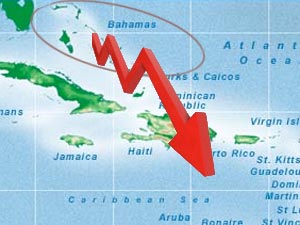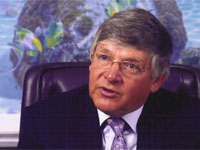
A comprehensive survey involving thousands of accountants from around the world notes that business confidence in The Bahamas is the lowest in the Caribbean.
The Global Economic Conditions Survey, conducted by the Association of Chartered Certified Accountants (ACCA) and the Institute of Management Accountants (IMA), gauges the economic climate through the lens of more than 2,200 finance professionals worldwide.
While Jamaica has seen an improvement in business confidence, the region at large is underperforming compared the rest of the Americas.
Meanwhile, the survey places The Bahamas at the bottom of the list.
“The Bahamas has underperformed compared to the rest of the region amidst pre-election uncertainty, ending 2011 with lower confidence levels and additionally gaining less confidence than other Caribbean countries in the first months of 2012,” said Brenda Lee-Tang, the head of ACCA Caribbean. “Although the employment outlook and general business conditions across the region appear to have improved, businesses are still under a lot of pressure and respondents have cited fewer new value-added business opportunities.”
The sobering report stands in contrast to the worldwide view.
Total respondents around the world felt more confident, increasing from 16 percent in 2011 to 29 percent early this year. While 54 percent believed the global economy was still deteriorating or stagnating, that figure is down from 73 percent in the previous year.
John Bain, top accountant and principal at JSB & Associates, told Guardian Business that the lack of optimism is partly due to the ongoing election . Where there is uncertainty, people prefer not to spend money, he said, and when demand is down the economy contracts.
That said, he noted that government spending has increased substantially in the lead up to the election.
“Most Bahamians may be of the opinion that the increased activity of the economy is only an ‘artificially implanted’ activity and is expected to end after or soon after the elections,” Bain added, who also serves as ACCA’s representative in The Bahamas. “As a consequence of the election spending and the government’s attempt to jump start the economy, our government debt has increased and we have a dangerous debt-to-GDP ratio.”
In fact, The Bahamas felt the full weight of the crisis in 2011, suffering two major downgrades. Last August, Moody’s revised the country’s outlook from stable to negative, while affirming the A3 government bond ratings. National debt increased almost 150 percent over the past decade to nearly 50 percent of GDP at the end of 2010.
Moody’s further projected there were limited growth prospects down the road. Less than three months later, Standard & Poor’s downgraded the country’s long-term credit rating from BBB+’ to ‘BBB/A-3’, as the regulator revised the way it evaluates sovereign ratings.
“We can also expect some taxation increases or new taxes because of the government’s increased social spending,” Bain told Guardian Business.
The accountant further cited issues such as the New Providence Road Improvement Project, the high unemployment rate and the growing crime problem as other factors contributing to low business confidence.
Whichever party wins the general election, the ACCA representative urged the administration to “hit the ground running” with new ideas to stimulate the economy. Genuine diversification of the economy is one solution, he said, but ultimately education is often the key to change.
“There is a never ending need for further investment in education in order for Bahamians to remain relevant and ready for the challenges of today’s business world,” Bain noted. “Organizations like the ACCA are well suited to assist in this, offering value for money education opportunities.”
Jeffrey Todd
The Nassau Guardian



